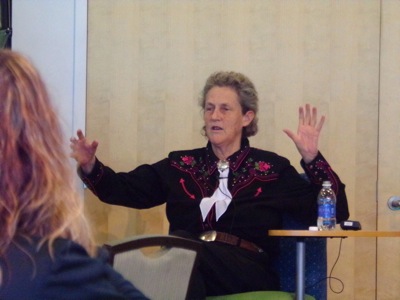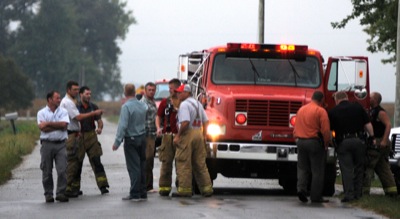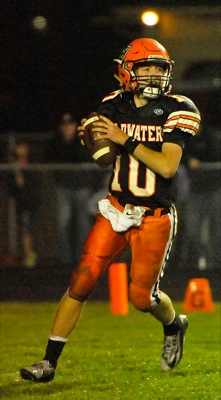Saturday, September 12th, 2015
Grandin shares animal insights
By Nancy Allen

Photo by Nancy Allen/The Daily Standard
Dr. Temple Grandin speaks to a group of ag students, faculty and staff Thursday at Wright State University-Lake Campus in Celina.
CELINA - An animal behavior expert believes humans have the right to raise livestock for food but should treat the creatures humanely, noting they feel fear and pain as humans do.
"In the 1980s and early '90s there was disastrous treatment of animals. It was very bad," Temple Grandin told about 50 agriculture students and staff Thursday at Wright State University-Lake Campus. "I started out thinking I could solve all the problems with technology but I found out management needed help."
Grandin, who has autism, said her ability to think in pictures gives her insight into animal behavior and helped her design various livestock handling technology, including a curved shoot for leading cattle to slaughter. She's an animal behavior expert and advocate for animal welfare and people with autism.
Grandin spoke with disdain about animal rights groups who seek a meatless society.
"Social media magnifies the radicals on both sides of an issue," she said. "It means people are staying in their silos more. People aren't thinking and engaging."
She railed against ag livestock officials who focus too much on profit at the expense of animals. She also said the industry needs to breed healthier livestock that can better resist diseases such as avian influenza that affected commercial chicken and turkey flocks this year and porcine epidemic diarrhea that killed local piglets a few years ago.
"The problems with the livestock industry is they are pushing biology that contributes to heavier animals with poor legs and lameness," she said. "Maybe we better breed a little more hardy animal because biosecurity is going to get breached."
A young lady named Tiffany asked Grandin what female students should do to further their careers in agriculture.
"The thing I tell everybody is try internships to try on a career," she said. "Get jobs out on the crop farm, the pig farm, the turkey farm. People asked me how I got interested in cattle. I was exposed to cattle on my aunt's ranch at the age of 15."
"Trying on a career" helps students make a better choice, she said.
"With as expensive as school is getting, you don't want to be spending all this money for something you hate," she said.
She called the notion that genetically modified organisms may cause autism "absolutely, totally ridiculous," in answering another question.
She argued the ag industry has places for both standard, large-scale commercial farms and niche market farms such as those raising local and organic foods.
"Don't bash each other but sell your own product," she said.
Encouraged early by parents, teachers and others, Grandin became a high-functioning autistic person. She explained that her brain thinks in images and she is able to see things in complex detail.
"In autism you lose social circuits in the brain but you gain others," she explained. "I can do 3D visualization in my head. For a while I thought everybody could."
She also said an apparent increase in the number of cases of autism and autism spectrum disorders is likely due to better detection. When she was young, people such as herself were called nerdy.
Greg McGlinch, who moderated Thursday's program asked Grandin what she wanted her legacy to be.
"I want to see other kids similar to me grow up and be successful, not kids inside playing video games and on social media," she said. "Get out on the farm, have a good life and careers."
Autism is a neurobehavioral disorder that includes impairments in social interaction and developmental language and communication skills combined with rigid, repetitive behaviors. The disorder covers a large spectrum of symptoms, skills and levels of impairment.
Nikki Hawk, administrator/education specialist at the Mercer County Soil and Water Conservation District, was among those attending Thursday's program. Hawk's 13-year-old son, Isaac, is autistic.
"I just think she's a rock star in the world of autism and animal behavior," Hawk said. "We were so fortunate to have her here."
Grandin has penned numerous books, including "Animals in Translation," "Animals Make us Human" and "Improving Animal Welfare: A Practical Approach."
She is a professor of animal science at Colorado State University, consultant to the livestock industry and autism activist. She is the subject of an award-winning biographical film and was listed in Time magazine's list of 100 most influential people in the world in the heroes category.
She earned a bachelor's degree in psychology from Franklin Pierce College in 1970, a master's degree in animal science from Arizona State University in 1975 and a doctoral degree in animal science from the University of Illinois at Urbana-Champaign in 1989.
In her writing Grandin explains how autism shapes her daily life. She wears soft and comfortable clothes to balance her sensory integration dysfunction and avoids sensory overload at all costs. As a teen, Grandin designed a "squeeze machine" based on the containers used to pacify cattle during immunizations. She found the device significantly helped her manage her anxiety.




